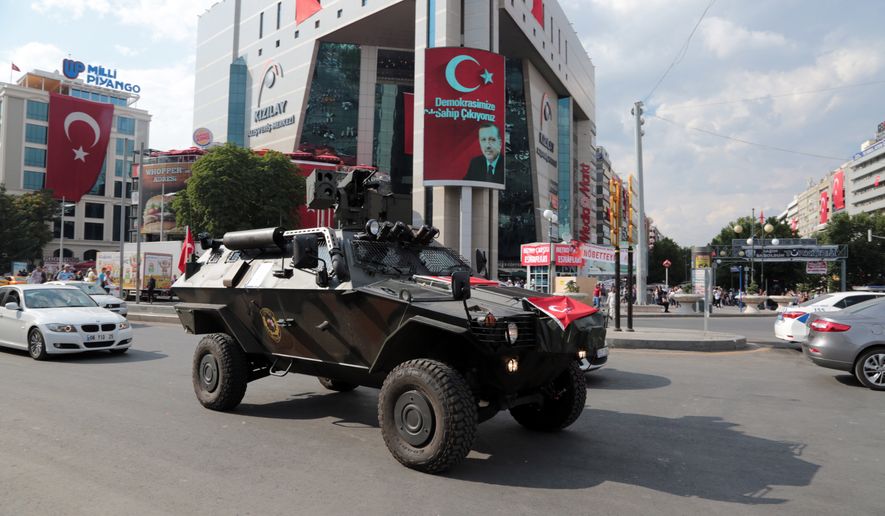As Turkey’s government continues its crackdown, firing and suspending thousands of people from its workforce, the nation is becoming increasingly vulnerable in a nasty neighborhood, regional experts warned Wednesday.
Turkish officials are blaming Fethullah Gulen, an elderly Turkish cleric currently living in Pennsylvania, as the mastermind behind this weekend’s failed plot to overthrow President Recep Tayyip Erdogan.
The government is widening its net to sack anyone who might be loyal to Mr. Gulen. So far, the government has purged about 50,000 people and about one-third of the military’s highest-ranking generals.
Kemal Kirisci, a Turkey analyst at the Brookings Institute, said Turkey’s military is likely “at it’s weakest in history right now.”
But there’s no time for Turkey to be unstable: Turkish security forces are still fighting Kurdish insurgency — the Kurdistan Workers’ Party — in the southeast part of the country, and still shares a border with Iraq, a nation ridden with Islamic State presence. Omer Taspinar, a senior fellow at the Brookings Institute, said these massive purges will hinder the military’s ability to fight its current battles.
“There is no morale and there is no cohesion left in the Turkish army. This is unprecedented,” Mr. Taspinar said. “Forget about Syria, forget about the regional dynamics — we’re talking about an institutional failure, a potential collapse of Turkey as we know it.”
State media reported on Wednesday that Turkish forces have resumed fighting with the Kurds. Turkish troops launched their first airstrikes on Kurdish militants since the coup attempt. 20 PKK fighters were killed.
Experts say implications will be heavy on Turkey, but also on U.S.-Turkey relations. Turkey, a NATO member, has been a crucial ally in the U.S. fight against terrorism in Iraq and Syria, leaving the U.S. with limited options for action if Mr. Erdogan commits human rights violations or weakens Turkey’s democracy and rule of law James Jeffrey, a senior fellow at the Washington Institute, said.
“The problem is that we’ve been doing this for years with Erdogan and he doesn’t listen,” Mr. Jeffrey said. “But Turkey is too important, and the other fights we have in the Middle East — with ISIS, with the Iranian problem, with Syria — are too fundamentally important to the region and international peace so the administration has limited options.”
Another point of contention comes as the U.S. houses Turkey’s most-wanted cleric. Turkey has asked the U.S. to extradite Mr. Gulen back to Turkey, but U.S. officials said Turkey must provide proof that Mr. Gulen was involved in the coup attempt.
“In the eyes of the Turkish nation, the United States is refusing to release someone who is as dangerous as Osama Bin Laden,” Mr. Taspinar said. “This can go very far in terms of US-Turkey relations, and Turkey could react very irrationally. Erdogan escaped a coup assassination — he is a wounded tiger and he will extract revenge not just domestically but also externally.”
The Turkish government filed information electronically to the U.S., but the State Department said it’s still in the process of analyzing the documents.
As Turkey’s government presses for Mr. Gulen, they will likely continue to purge his alleged loyalists within Turkey’s borders. The crackdown started with security forces but has spread to Turkey’s entire civilian infrastructure. 15,000 teachers have lost their jobs, and authorities have banned all academics from travelling abroad.
The president declared a three-month state of emergency in the rattled nation. Mr. Jeffrey said that the Mr. Erdogan has earned “legendary” status in escaping this coup attempt.
“The number one victor in all of this is the president,” Mr. Jeffrey said. “He’s going to use this power to try and ensure that nothing like this happens again and to further build up his power … which has been his goal since he entered politics.”
• Jessie Fox can be reached at jfox@washingtontimes.com.




Please read our comment policy before commenting.